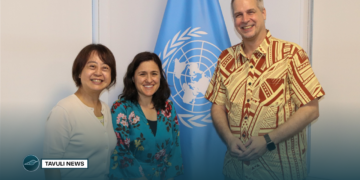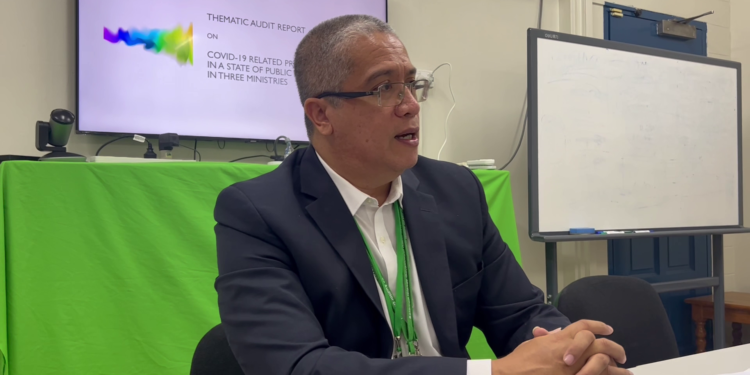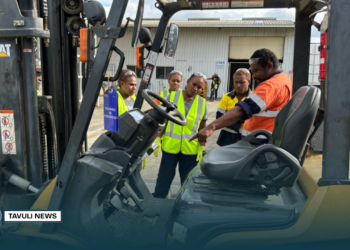By Georgina Kekea
Reports by the office of the Auditor General found that there has been gross misuse of the systems in place to acquire goods and services during the COVID-19 pandemic. $90 million was spent on goods, services and works to support the response to the COVID-19 pandemic from March 2020. This was by three government Ministries. M.I.D, Ministry of Health and NDMO through the Environment Ministry. The Office of the Auditor General says most of the goods and services were acquired through a shortened procurement process. The report from the AG office says the Ministries had to work at pace, with no experience of using emergency procurement on such a scale before and were developing their approach at the same time as procuring large quantities of goods and services quickly.
‘There were alot of common issues that existed across all three Ministries. And so what we did was to call it out and provide some recommendations that we’ve directed to the Ministry of Finance and Treasury for them to consider’, says Auditor General David Dennis.
Of NDMO, the Audit Report says there is a lack of transparency in disaster relief funds for COVID-19. The Auditor General’s office reported that NDMO has not adequately monitored appropriated funds available. The report says NDMO committed funds and made payments prior to the issue of a warrant by the Minister for Finance, in contravention of the country’s laws. Over $30 million was spent on disaster relief before the Supplementary Budget was approved and no advance or contingency warrant was issued to support this expenditure.
‘I think there was an issue around expending resources that were not appropriated by parliament. That is actually a matter that is outside of our remit. That is not under our control. We are an operational arm of the government to implement our mandate’, says Chairman of the National Disaster Council, Dr. Melchior Mataki.

The National Disaster Management Office (NDMO) reports to the National Disaster Council, the government’s Advisory body. Dr. Melchior Mataki as Permanent Secretary of the Ministry of Environment, Climate Change Disaster Management and Meteorology is the Chairman of NDC. NDMO reports to NDC.
NDMO during the State of Public Health Emergency, coordinated the whole-of-government preparedness and response to social and economic impacts of COVID-19 and were tasked with ensuring the quarantine centres were appropriately equipped and for the maintenance and operation of the centres.
‘It was never our intention to really do that, to expend resources. But you have ongoing operations. What else would you need to do? You would have to get the necessary services and equipment in place so that the operation can be on-going’, says Mataki.
For the Ministry of Health, the Audit report gave an example of the $4.7 million spent on the refurbishment of the Multipurpose Hall. The AG report says there was no transparency around procurement rules and that individual decisions were not made public.
“For example, the refurbishment of the Multipurpose hall into an isolation ward was contracted at a cost of $4.7 million but there was no document supporting the selection of the specific vendor chosen to do the refurbishment. The first documentation available for this project was a letter from the vendor on 5 October advising a contract price and also indicating that work was well underway. This means that work was started even before a contract price was established”.

The report says it was three weeks later, on 26 October 2020, the Health Permanent Secretary indicated to the Oversight Committee that this refurbishment work was 95% complete, but a Purchase Requisition was not signed until 20 November 2020. Neither the availability of this contract nor its award was publicly advertised. The procedure used to select vendors in non-competitive procurement is also not documented and neither is the reasoning for individual selection decisions.
But responding to the press regarding the $4.6 million, the Health Permanent Secretary says there is a procurement contract, administrative manual 2013.
‘Now in the manual, in any three of the manuals, you have a bid waiver. The bid waiver stipulates certain reasons to do a procurement upon bid waiver. First you have Solomon Islands at war, we have a public health emergency, we have a natural disaster, specialised emergencies not available in the country and of course there is a committed market. There is a limited market in the country. So as a bid waiver we went for the public health emergency’.
‘Now I want us to put this in context. If we were at war, we would want to have all our bullets, our munitions in place. We cannot wait. If we go through the process, we would be already invited by our enemies, right’, says PS Pauline McNeil.
She said the market was limited too during the pandemic because of border closures.
The Ministry of Infrastructure were also reported to by-pass certain FInancial instructions regarding bid waiver.
But the Infrastructure Minister, Permanent Secretary, Stephen Maesiola says he has just seen the report and cannot make any comments. He said he was aware only of the shortfalls, when the report was published.

Chairman of the National Disaster Council says the report by the AG Office was fair and they accept the recommendations by the Auditor General’s Office. His ministry later issued a press statement saying NDMO is committed to implement audit report recommendations.
In the AG thematic report, there are 8 recommendations for the government ministries.
‘Of course each of the Ministries have their own recommendations and we do invite the executives of each of the ministries to also engage in our reports as well’, says AG, David Dennis. The reports on the ‘Procurement Relating to COVID-19 Disaster Relief Fund’ are the first of the reports published by the OAG since 2019.






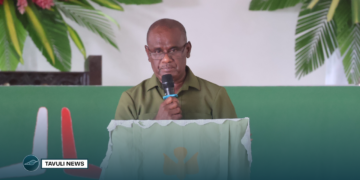
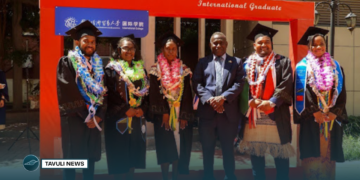
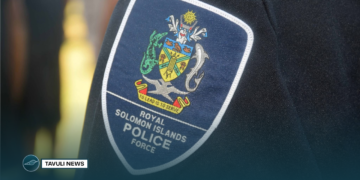




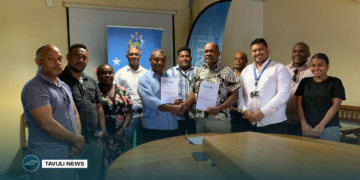

















![Chovohio [left] and Charivunga [right] confluence, to create a dam for sediment control](https://www.tavulinews.com.sb/wp-content/uploads/2025/04/Add-a-heading-43-360x180.png)



























